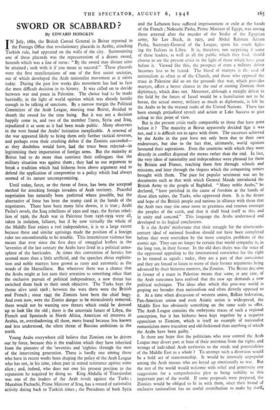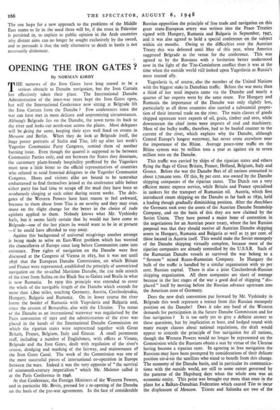SWORD OR SCABBARD ?
By EDWARD HODGKIN
I N July, 1880, the British Consul General in Beirut reported to the Foreign Office that revolutionary placards in Arabic, attacking Turkish rule, had appeared on the walls of the city. Surmounting
one of these placards was the representation of a drawn sword, beneath which was a line of verse: "By the sword may distant aims be attained ; seek with it if you mean to succeed." These placards
were the first manifestations of one of the first secret societies, out of which developed the Arab nationalist movement as it exists today. During the past few weeks this movement has had to face the most difficult decision in its history. It was called on to decide between war and peace in Palestine. The choice had ta be made hurriedly, in the light of world opinion which was already hostile enough to be talking of sanctions. By a narrow margin the Political Committee of the Arab League, meeting near Beirut, decided to sheath the sword for the time being. But it was not a decision happily come to, and two of the member states, Syria and Iraq, repudiated it as. soon as it had been made public. Many observers in the west found the Arabs' hesitation inexplicable. A renewal of the war appeared likely to bring them only further tactical reverses, and perhaps even their crushing defeat if the Zionists succeeded— as they doubtless would have, had the truce been rejected—in legitimising their importation of foreign arms. But the majority at Beirut had to do more than convince their colleagues that the military situation was against them ; they had to use argument to break a tradition which had hitherto been above argument and to defend the application of compromise to a policy which had always seemed of its nature uncompromising.
Until today, force, or the threat of force, has been the accepted method for attacking foreign invaders of Arab territory. Peaceful negotiation has naturally been preferred where possible, but the alternative of force has been the trump card in the hands of the negotiators. There have been many false dawns, it is true ; Arabi Pasha's revolt, the Iraq rebellions of 1920 and 1941, the Syrian rebel- lion of 1926, the Arab war in Palestine from 1936-1939 were all, taken in isolation, failures, but if by now virtually the whole of the Middle East enjoys a real independence, it is to a large extent because these and similar uprisings made the position of a foreign ruler too uncomfortable to be tenable. This intermittent violence has meant that ever since the first days of smuggled leaflets in the 'seventies of the last century the Arabs have lived in a political atmo- sphere of the barricades. At times this convention of heroics has seemed more than a little artificial, and the speeches about exploita- tion and noble martyrs have grown as rusty and automatic as the words of the Marseillaise. But whenever there was a chance that the Arabs might at last turn their attention to something other than the exclusive pursuit of political independence, a new threat has switched them back to their stock objective. The Turks kept the theme alive until 1918 ; between the wars there were the British and French ; since 1945 the Zionists have been the chief bogy. And even now, were the Zionist danger to be miraculously removed, there would not be wanting new threats which could be dressed up to look like the old ; there is the uncertain future of Libya, the French and Spaniards in North Africa, American oil interests in Arabia, or, overshadowing all these, more feared because less known and less understood, the silent threat of Russian ambitions in the north.
Young Arabs everywhere still believe that Zionism can be driven out by force, because this is the tradition which they have inherited from the pioneers of the 'seventies and 'eighties through the men of the intervening generation. There is hardly one among those who have in recent weeks been shaping the policy of the Arab League who has not, in his time, taken part in armed resistance against some alien ; and, indeed, who does not owe his present position to the reputation he acquired by doing so. King Abdulla of Transjordan was one of the leaders of the Arab revolt against the Turks ; Muzahim Pachachi, Prime Minister of Iraq, has a record of nationalist activity dating back to Turkish times ; the Presidents of both Syria and the Lebanon have suffered imprisonment or. exile at the hands of the French ; Nokrashi Pasha, Prime Minister Of Egypt, was among those arrested after the murder of the Sirdar of the Egyptian army, Sir Lee .Stack, in 1925, and Abdul Rahman Azzam Pasha, Secretary-General of the League, spent his youth fight-
ing the Italians in Libya. It is, therefore, not surprising if some of these leaders, as well as all the public which they lead, should choose to see the present crisis in the light of those which have gone
before it. Viewed like this, the prospect of even a military defeat becomes less to be feared. The blood of martyrs is th seed of nationalism as often as of the Church, and those who opposed the truce in Palestine did so on the grounds that war, which provides martyrs, offers a better chance in the end of ousting Zionism than diplomacy, which does not. Moreover, although a straight defeat in the field by the forces of Israel would be a humiliation not to be borne, the actual enemy, military as much as diplomatic, is felt by the Arabs to be the massed ranks of the United Nations. There has been enough prejudiced speech and action at Lake Success to give colour to this point of view.
But is the present crisis really comparable to those that have gone before it ? The majority at Beirut apparently decided glat it was not, and it is difficult not to agree with them. The successes achieved by the Arabs in the past have not only been due to their own endeavours, but also to the fact that, ultimately, world opinion favoured their aspirations. Even the countries with which they were directly in conflict disputed the means rather than the end. In fact, the very ideas of nationality and independence were phrased for them by Britain and France, reaching them first through schools and missions, and later through the slogans which the conquering armies brought with them. The pace for popular sentiment was set by documents such as that with which General Maude introduced the British Army to the people of Baghdad. " Many noble Arabs," he declared, " have perished in the cause of freedom at the hands of those alien rulers, the Turks, who oppressed them. It is the desire and hope of the British people and nations in alliance with them that the Arab race may rise once more to greatness and renown amongst the peoples of the earth, and that it shall bind itself to this and in unity and concord." This language the Arabs understood and developed to its logical conclusiOns.
It is the Arabs' misfortune that their struggle for the nineteenth- century ideal of national freedom should not have been completed before they were overtaken by the more complex problems of the atomic age. They can no longer be certain that world sympathy is, in the long run, in their favour. In the old days theirs was the voice of the oppressed appealing to the international conscience for the right to be treated as equals ; today, they are a part of that conscience and they are forced to listen to many of their former arguments being advanced by their bitterest enemies, the Zionists. The Beirut dec:sion in favour of a truce in Palestine means that some, at any rate, of the Arab statesmen have realised that the new age demands a new political technique. The ideas after which this post-war world is groping are broader than nationalism and often directly opposed to it. At a time when discussion of western union, Balkan federation, Pan-American union and even Asiatic union is widespread, the Middle East has obviously something on the same scale to offer. The Arab League contains the embryonic traces of such a regional conception, but it has hitherto been kept together by a negative opposition to Zionism, which is itself an example of nationalist romanticism more truculent and old-fashioned than anything of which the Arabs have been guilty.
Is there any hope that the politicians who now control the Arab League may divert part at least of their attention from the rights and wrongs of individual Arab territories to the needs and potentialities of the Middle East as a whole ? To attempt such a diversion would be a bold act of statesmanship. It would be intensely unpopular among the Arab masses who are keyed up emotionally to war. But the rest of the world would welcome with relief and generosity any suggestions for a comprehensive plan to bring stability to this important part of the world. If some proposals were prepared, the Zionists would be obliged to fit in with them, since their brand of exclusive nationalism has no useful contribution to make by itself4 The one hope for a new approach to the problems of the Middle East seems to lie in the need there will be, if the truce in Palestine is persisted in, to explain to public opinion in the Arab countries why distant aims can no longer be sought exclusively by the sword, and to persuade it that the only alternative to death in battle is not necessarily dishonour.



































 Previous page
Previous page